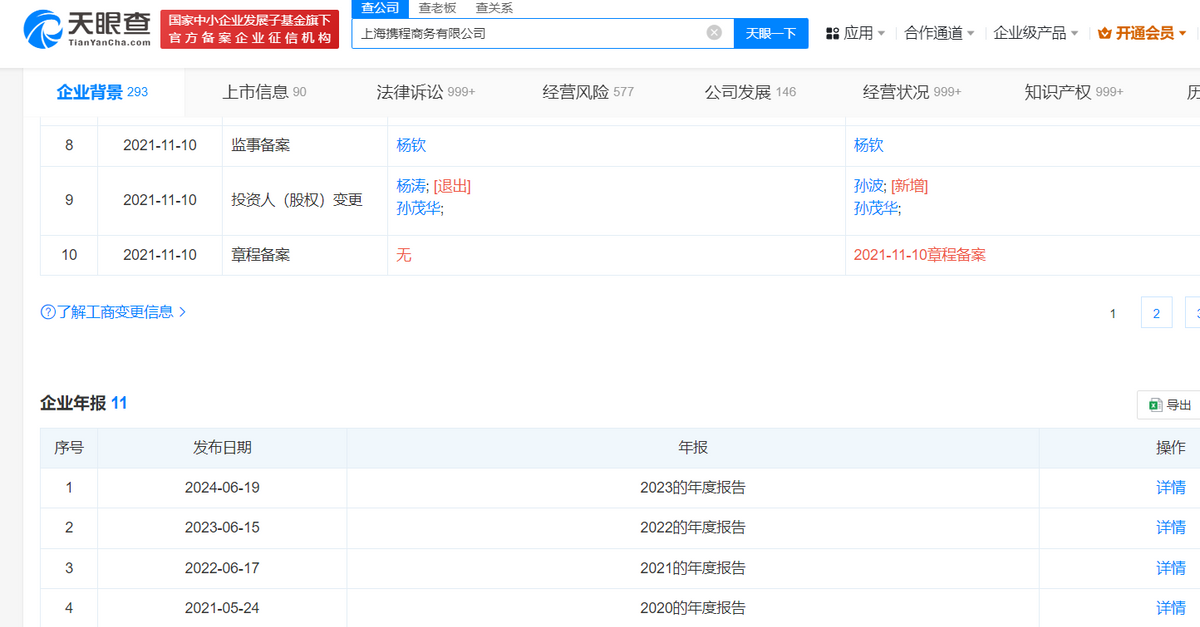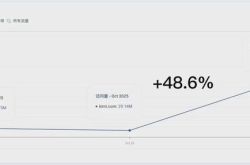The ambitions of Meituan, Ctrip, and Didi Enterprise Editions: Doing B2B Business, Stabilizing the C2C Market
![]() 07/02 2024
07/02 2024
![]() 548
548
In the great transition from consumer internet to industrial internet, Chinese tech giants have actually taken two distinct routes:
Some, like Baidu and Alibaba, have chosen the hard tech route of cloud computing, cloud services, and large models. But others, such as Meituan, Didi, and Ctrip, have chosen to carve out a path in enterprise services based on their original consumer routes.
Recently, the Meituan Enterprise Edition · Enterprise Consumption Panoramic Solution Launch Event themed "Simplicity" was held in Shenzhen. Although the associated noise is not prominent, it doesn't prevent us from seeing that Meituan's strategic signal of steadily advancing its B-end market layout is still there.
In fact, it's not just Meituan that's developing an enterprise edition. Didi, Ctrip, and even Ele.me before have also launched enterprise or business travel editions, all targeting corporate consumption and expense control reimbursement!
This naturally raises the question: why have Meituan and Didi chosen this path? Where are the Meituan Enterprise Editions that have transformed from C2C to B2B now? And are there any deeper strategic meanings behind it?
Meituan, Didi Enterprise Editions: Doing B2B Business, Stabilizing the C2C Market
The greatest value of B-end services lies in "cost reduction and efficiency enhancement."
This is something that many companies are eager to achieve under the current macroeconomic situation. It is also the fundamental development logic of Meituan Enterprise Editions.
From an external perspective, the biggest difference between Meituan Enterprise Editions and expense control and reimbursement SaaS is that Meituan Enterprise Editions can cut in from the consumption front end, directly satisfying complex and even fragmented business consumption needs. They can also comprehensively clarify the composition of consumption costs from the backend, allowing companies to actively control and optimize consumption.
For example, Meituan Enterprise Edition can provide various dining options such as welfare meals and group meals for employees of partner companies; Didi Enterprise Edition allows employees with business travel needs to use corporate accounts for booking and payment, achieving paperless reimbursement.
In addition, Meituan Enterprise Editions have already been integrated with systems such as OA, IM, and finance and taxation. Even before the upgrade of Meituan Enterprise Edition, employees could directly enter Meituan Enterprise Edition by clicking on a link in office software such as Feishu and DingTalk, saving a lot of decision-making, reimbursement, and audit processes.
In contrast, SaaS players in expense control and reimbursement, represented by Hesy and Fenbeitong, cover business travel and dining scenarios, but they are more focused on providing budget management, electronic archives, and other areas of cost reduction and efficiency enhancement for backend financial personnel. As for complex front-end consumption scenarios, as well as false transactions and irregular invoices, it is difficult to achieve effective management.
In short, Meituan Enterprise Editions focus on consumption scenarios and corporate management, while finance and taxation SaaS is more about financial management. Although there is some overlap in consumption aspects, the main focus is misaligned, and there is unlikely to be "life-or-death" competition.
So, even though the backend financial control of enterprise consumption SaaS like Meituan may be slightly inadequate due to the significant differences in organizational structure and financial processes across different industries and companies, from the perspective of enterprise customers, the two seem to complement each other perfectly.
From an internal perspective, Meituan and Didi Enterprise Editions also have their own competition and differences.
After all, the more complex and diverse consumption scenarios covered by consumer SaaS enterprise editions, the more cost-effective and convenient it is for enterprise customers in terms of expense management.
It is obvious that Meituan Enterprise Edition, which covers scenarios such as eating, drinking, entertainment, travel, and accommodation, undoubtedly has more competitive advantages than Didi and Ctrip.
This can be seen from their positioning. Now, Didi Enterprise Edition and Ctrip Business Travel mainly provide "one-stop car and business travel services for enterprises," including car rentals, flight bookings, hotel reservations, and other business consumption scenarios.
However, Meituan Enterprise Edition boasts a "one-stop management platform for corporate business consumption." In addition to travel and accommodation scenarios, relying on its accumulated C-end dining resources, Meituan has also launched solutions for employee welfare meals, hospitality meals, and other scenarios. This is Meituan's unique competitive advantage among current C-end cross-border players.
The only comparable one is Ele.me's corporate catering business, which has been discontinued and subsequently incorporated into Alipay's system.
The reason for its discontinuation may be similar to the dilemma faced by traditional group meal players represented by Qianxihe, who cater to government agencies, hospitals, etc. - the consumption scenario is too single, mainly focused on catering, lacking integrated corporate services such as accommodation, travel, and expense control reimbursement.
Of course, the diverse consumption scenarios covered by Meituan Enterprise Edition have both advantages and "disadvantages."
In this regard, Xie Jia, an investor in the B-end field of China Creation Ventures, previously stated that the gross profit margin of services in enterprise services is usually not too high, but they can indeed help customers solve problems. However, such companies are not typical targets for VCs.
Fundamentally, the more consumption scenarios covered by enterprise editions, the more they need to understand and satisfy the personalized needs of different industries and companies, which undoubtedly increases the overall input cost. Therefore, it is necessary to balance the operational and organizational capabilities of individual needs and common needs. This is reflected in lower profit margins from a financial perspective.
Even so, there are reasons why Meituan Enterprise Edition and Ctrip Business Travel have to continue to increase their investments:
Firstly, "offensive" to seek growth on the B-end. As early as 2020, data showed that the expense scale of the five major scenarios of business travel, transportation, group meals, procurement, and welfare alone had reached the trillion-level. Now, the market size of corporate expense management has long exceeded the hundred-billion level.
For traditional internet giants that are currently facing the end of demographic and traffic dividends, as well as the comprehensive impact of "barbarians" like Douyin and Kuaishou, this is no less than a timely rain.
For example, according to Tianyancha APP, in 2023, Ctrip's business travel management segment generated revenue of 2.3 billion yuan, almost doubling compared to the 1.3 billion yuan revenue in 2021...

Secondly, "defensive" to consolidate the C-end market advantage and resist the competition from Douyin and others for local life services.
Taking Meituan as an example, as a leading company in the local life services market, it is now facing invasions and competitions from multiple angles from Douyin, Kuaishou, Xiaohongshu, and video accounts.
In the content era, Meituan cannot compete with these platforms in terms of user traffic, and relying on burning money to subsidize merchant users is not a long-term solution. It can even be said that under the current C-end traffic standard rules, it is difficult for Meituan to completely withstand the competition from Douyin and Kuaishou.
Therefore, Meituan is now cutting in from the B-end, starting from major scenarios such as eating, staying, traveling, shopping, and entertainment. By binding corporate business consumption management, it indirectly binds a part of employees' local life needs with brand merchants in a "monopolistic" manner.
Since it faces the value relationship chain centered on enterprises, these white-collar users are hardly affected by any C-end influence from platforms like Douyin. And because users' local life consumption needs are limited, the competitive pressure on Meituan's local life services is mitigated to a certain extent.
In fact, Douyin has not yet launched a B-end enterprise edition. For Meituan, "I have it, you don't" means a moat barrier and the success of defensive counterattacks...
Who is the ultimate winner: low prices or market penetration?
No matter how much is said, Meituan's efforts in corporate consumption management are essentially innovative extensions around local life services, attempting to find growth with new approaches.
The reason for this is that the main battlefield of local life services has now entered a fierce "close-quarters combat" stage.
To this end, Meituan has even begun to increase its content focus to improve user retention and attractiveness. For example, from the full launch of the short video entry at the bottom center tab of the Meituan App to the addition of a theater channel this year. Also, in 2023, Meituan's sales and marketing expenses increased by 47.5%, with two key points highlighted in the financial report:
Firstly, it enhanced content display capabilities and introduced multiple content production methods such as images, text, videos, and live broadcasts. Secondly, it upgraded and simplified the takeout membership system.
Obviously, the main marketing capital investment cuts are in content and subsidizing C-end consumers.
However, content layout takes time, and the construction of a content ecosystem cannot be achieved overnight. Even if Meituan invests long-term, its success is not guaranteed in the future. After all, Meituan's versatile tool attribute is too strong, and users only browse content when they have a need, rather than staying for interest-driven content like on Douyin and then achieving consumption conversion...
Therefore, in the second half of local life services, Meituan has still been dragged into the quagmire of low prices and market penetration by platforms like Douyin.
Firstly, low prices. Adhering to a low-price strategy has been the secret of Douyin's rapid growth since entering the local life services sector and is still being continuously strengthened.
To counter this, over the past year, Meituan has launched various "low-price" counterattacks against Douyin's life services, including phased subsidies, live broadcasts, and more.
Although they have indeed produced some positive results from a performance perspective. In 2023, Meituan's core local business segment revenue increased by 28.7% year-on-year to 206.9 billion yuan.
Unfortunately, from a macro perspective, these actions are passive and limited, neither in line with the company's development needs under a profit cycle nor long-term enough to cope with the new demands of the already arrived cost-effective consumption cycle.
Therefore, what Meituan should truly establish is a more systematic low-price capability that leverages its own advantages and finds its own rhythm.
In fact, just like content and traffic are to Douyin, as Meituan's key traffic entry point, takeout seems to serve as a linkage device with other functions of the Meituan ecosystem, helping to establish a more systematic low-price capability for Meituan.
For example, some industry insiders have mentioned that after the integration of dine-in and home delivery businesses, Meituan can actually use merchants' reliance on its takeout platform as leverage to obtain greater discounts on takeout products and group purchases through efficiency improvements. This is an ecological synergy that can better serve merchants holistically...
Secondly, market penetration. Last July, Meituan Takeaway issued a recruitment order for partner cities, recruiting partners in blank areas such as townships, scenic spots, and industrial parks. In September, Douyin followed suit, launching the "regional service provider business" to attract and partner with high-quality regional service providers to jointly serve the needs of local small and medium-sized merchants.
The shortcomings of Douyin's incomplete local life infrastructure may be exposed.
For example, delivery performance, an essential part of local life services, has largely contributed to Meituan's prominence, thanks to its massive logistics support. But for Douyin, which has crossed over from a content platform, there is not much accumulation in this area.
Although Douyin can temporarily alleviate delivery issues through third-party cooperation, it will still be significantly limited by overall delivery costs. The only possible quick solution is to acquire a company with delivery capabilities, but it remains to be seen what choice Douyin will ultimately make.
It seems that even though Douyin is now dominating the local life market, old players like Meituan still have the opportunity to turn the tide.
From breaking through corporate consumption management on the B-end to having absolute advantages in delivery capacity, Meituan's imagination in the field of local life services is far from reaching its limit.
This also echoes Wang Xing's favorite book, "Finite and Infinite Games": Finite games aim to win, while infinite games aim to continue the game, explore changing boundaries, and create unlimited possibilities...







